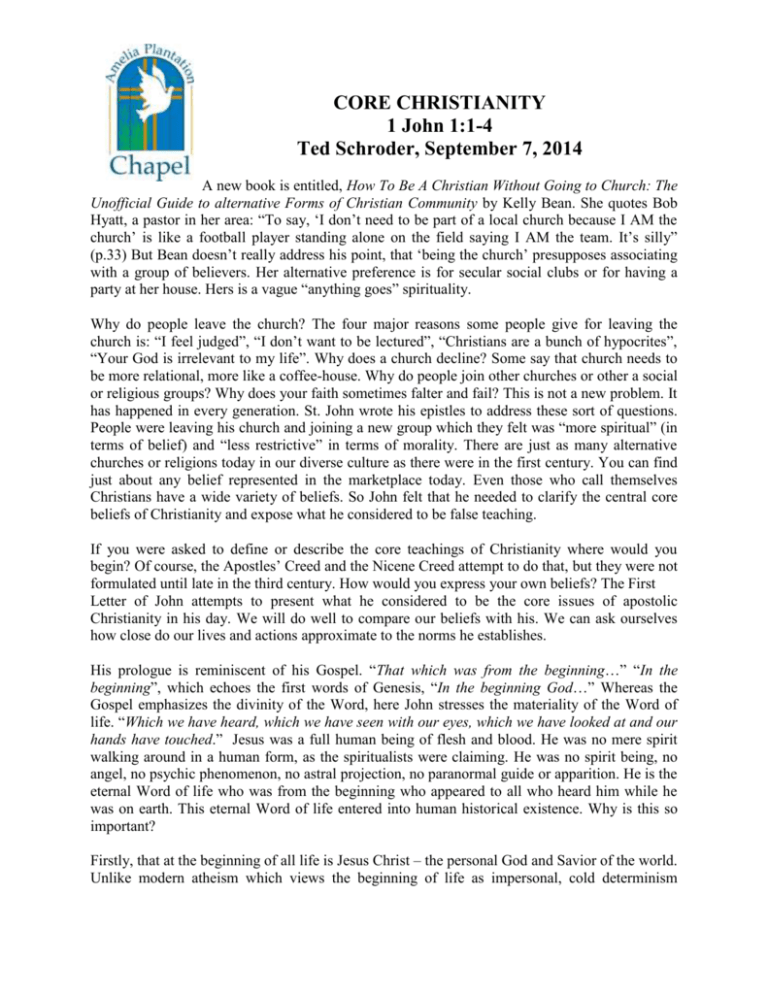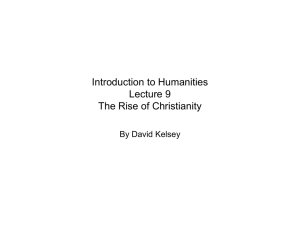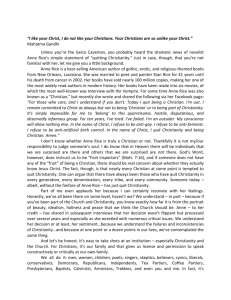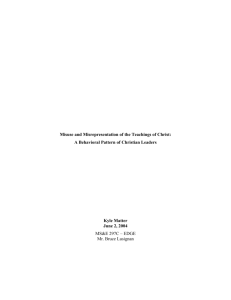2014-09-07 CORE CHRISTIANITY
advertisement

CORE CHRISTIANITY 1 John 1:1-4 Ted Schroder, September 7, 2014 A new book is entitled, How To Be A Christian Without Going to Church: The Unofficial Guide to alternative Forms of Christian Community by Kelly Bean. She quotes Bob Hyatt, a pastor in her area: “To say, ‘I don’t need to be part of a local church because I AM the church’ is like a football player standing alone on the field saying I AM the team. It’s silly” (p.33) But Bean doesn’t really address his point, that ‘being the church’ presupposes associating with a group of believers. Her alternative preference is for secular social clubs or for having a party at her house. Hers is a vague “anything goes” spirituality. Why do people leave the church? The four major reasons some people give for leaving the church is: “I feel judged”, “I don’t want to be lectured”, “Christians are a bunch of hypocrites”, “Your God is irrelevant to my life”. Why does a church decline? Some say that church needs to be more relational, more like a coffee-house. Why do people join other churches or other a social or religious groups? Why does your faith sometimes falter and fail? This is not a new problem. It has happened in every generation. St. John wrote his epistles to address these sort of questions. People were leaving his church and joining a new group which they felt was “more spiritual” (in terms of belief) and “less restrictive” in terms of morality. There are just as many alternative churches or religions today in our diverse culture as there were in the first century. You can find just about any belief represented in the marketplace today. Even those who call themselves Christians have a wide variety of beliefs. So John felt that he needed to clarify the central core beliefs of Christianity and expose what he considered to be false teaching. If you were asked to define or describe the core teachings of Christianity where would you begin? Of course, the Apostles’ Creed and the Nicene Creed attempt to do that, but they were not formulated until late in the third century. How would you express your own beliefs? The First Letter of John attempts to present what he considered to be the core issues of apostolic Christianity in his day. We will do well to compare our beliefs with his. We can ask ourselves how close do our lives and actions approximate to the norms he establishes. His prologue is reminiscent of his Gospel. “That which was from the beginning…” “In the beginning”, which echoes the first words of Genesis, “In the beginning God…” Whereas the Gospel emphasizes the divinity of the Word, here John stresses the materiality of the Word of life. “Which we have heard, which we have seen with our eyes, which we have looked at and our hands have touched.” Jesus was a full human being of flesh and blood. He was no mere spirit walking around in a human form, as the spiritualists were claiming. He was no spirit being, no angel, no psychic phenomenon, no astral projection, no paranormal guide or apparition. He is the eternal Word of life who was from the beginning who appeared to all who heard him while he was on earth. This eternal Word of life entered into human historical existence. Why is this so important? Firstly, that at the beginning of all life is Jesus Christ – the personal God and Savior of the world. Unlike modern atheism which views the beginning of life as impersonal, cold determinism characterized by the survival of the fittest with no meaning and purpose, at the core of Christianity is the belief that a God of love, revealed to us in the person of Jesus Christ, created us for a purpose, and came into real human space and time. When the pagan looks at the very core of the cosmos he is struck cold. Behind the gods, who are merely despotic, sit the fates, who are deadly. Nay, the fates are worse than deadly; they are dead. (G.K. Chesterton, Orthodoxy, p.159) Life has value, eternal value. We must never forget that or think that there is no significance to life. We are not just here to take up space and time while we await extinction. We are here for a reason. Let me commend to you the movie, God is Not Dead, starring Kevin Sorbo which addresses these issues. Secondly, that God has come in the flesh that can be seen, heard and touched. God is not untouched by your fragility, your vulnerability, your weaknesses, your mortality, your finiteness, your limitations. While world events may indicate that God is indifferent to human suffering and doesn’t intervene to save us – the belief of the Deist - St. John tells us that the Word of life comes alongside us and stands with us in the challenges and suffering of life. Jesus, the Eternal Word of life and yet also the Son of Man, is tested and tempted as we are. He is subject to all the stresses and strains of mortal life. He is not separated from you, or superior to you. He is Immanuel, God with us. Thirdly, that the aim and goal of this revelation is so that we may have fellowship with the Father and the Son and his people. We are meant to become part of a community of joy. We are to enjoy relationships with God and his people and become part of a community – the church of those who have experienced Jesus and become his followers. Human beings are not just individuals, but are social beings. Our identity is defined by our involvement in social institutions. Joy-filled Christian fellowship is at the heart of the Gospel of Christ. Christianity is relational. God is love and imparts his love to us in Jesus to share with one another. What then is at the core of our belief? It is the uniqueness of Jesus Christ. He is God incarnate, the Word made flesh in our midst. He is central, not as a spirit being, but truly human and truly divine. There can be no Christianity without this understanding of Jesus Christ. No group which waters down their understanding of Christ or plays down his significance as uniquely one with the Father can claim to be Christian. He was at the beginning. He will be at our end. He is the Alpha and the Omega. We are to have fellowship with him, with the Father, and with his people. That fellowship establishes relationships at the heart of Christianity. Our faith is meant to be experienced in community, not exercised in solitary loneliness. Joy is to be found in fellowship with one another. The church should be a place where we enjoy such fellowship, such love, such support and encouragement. Christianity is not just a head trip, a set of intellectual beliefs, but a community of loving souls seeking to serve one another. Christians do not seek to feather their own spiritual nests or seek to satisfy their own spiritual needs in isolation from others. We complete our joy in relationship with one another in Christ. Joy is the goal. Jesus said, “I have told you this so that my joy may be in you and that your joy may be complete” (John 15:11).











